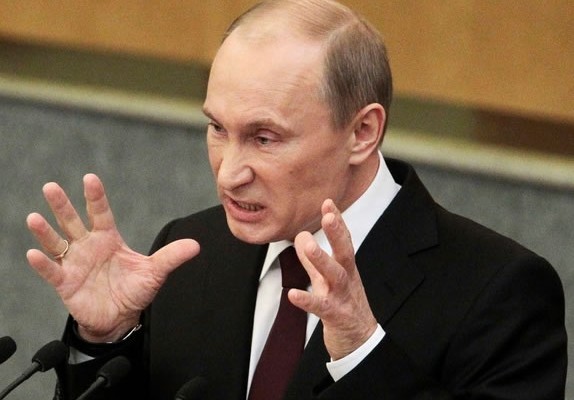By BARBARA S. HELD
Reporting about Russia’s brutal invasion of Ukraine has invariably raised questions about Vladimir Putin’s mental state. The words “unhinged,” “delusional,” “unbalanced,” “sociopathic” and “narcissistic” appear regularly.
Because Ukraine itself and the specter of World War III horrify many, people have asked me whether, as a psychologist, I think Putin is insane. I begin by saying I don’t know, and then explain my reasoning, beginning with the simplistic “Sad/Mad/Bad” guide to understanding seemingly pathological behavior.
Sad entails anxiety and depression — so-called neurotic states. The person experiences mental distress, but maintains a reasonable degree of contact with reality and is unlikely to harm others. The magnitude of Putin’s barbaric acts suggest that neurosis doesn’t contribute much if anything to them.
Mad refers to psychotic processes, such as schizophrenia. Mental distress may be present, but symptoms like hallucinations and delusions diminish contact with reality and hence rationality. Although many believe that severely mentally ill people are dangerous to others owing to well-publicized cases, they are more likely to be a victim of crime than a perpetrator. Of course, this finding is not based on the behavior of dictators like Putin.
Bad includes sociopathic and narcissistic behavior and carries a moral connotation, as do other personality/character disorders. Should people of bad character be considered mentally ill/mad? This is an especially thorny question in legal settings, as personality-disordered defendants have usually been judged to have sufficient contact with reality to be held accountable for their crimes. Insanity is a legal term, not a psychological one.
As University of Virginia Professor of Law and Medicine Richard Bonnie writes, the insanity defense hinges on “whether the defendant experienced a legally relevant functional impairment at the time of the offense.” Was the defendant able to “appreciate the wrongfulness of her conduct” or “conform her conduct to the requirements of the law.” These criteria constitute the “‘cognitive’ and ‘volitional’ prongs of the defense,” respectively. The former implicates one’s rationality, the latter one’s willful control. Personality disorders usually don’t conduce to a not-guilty-by-reason-of-insanity verdict.
Many wonder whether someone who commits mass murder can be sane. Can someone be that horrifically bad (with or without a personality-disorder diagnosis) without being mad? The law says yes. Consider Timothy McVeigh, the Oklahoma City bomber. He was judged sane and received the death penalty. And surely there are many people who wage war against an enemy, killing thousands, and aren’t technically crazy.
This brings us to the ubiquitous questions about Putin’s rationality. By all accounts, he misjudged the ease of his mission, and shows no remorse about his massive killing in Ukraine. But poor judgment and moral callousness alone don’t constitute legal insanity or madness in the psychological sense.
Putin’s mental state is of keen interest to intelligence officials and heads of state: Determining whether he’s a rational actor in his ongoing decision-making in Ukraine and beyond carries grave implications for NATO members’ decision-making in responding to his relentlessly brutal actions.
Our commonsense folk-psychology method of assessing someone’s rationality entails considering the relation between an act and the beliefs and desires that guide it. If someone is thirsty and turns on the faucet believing it will spout water, they’ll be judged rational. If they believe they can quench their thirst by drinking dish detergent and do so, they’ll be judged irrational.
Regarding Putin, try this thought experiment: Suppose Putin knows his campaign in Ukraine is doomed and he sees no point in living without reconstituting the Soviet Union under his rule. Assume he wants to end his life knowing his mission will fail, and starting World War III would satisfy his narcissistic desire for greatness. His desire will be judged profoundly defective by many. His methods are nothing short of pure evil.
Yet depending on one’s conception of rationality, some might suggest that (given these hypotheticals) Putin’s actions are rational. His desires and beliefs about how to fulfill them line up with his actions, however horrific. An individual judged rational in this way doesn’t ensure that the actions taken to achieve their goals are moral actions.
My point is to suggest that Putin could be seen as a rational actor and still push the nuclear button, depending on his goals. This puts President Biden and our NATO allies on the horns of a dilemma: how to save as many lives as possible without increasing the likelihood that Putin will plunge us into a new world war, whatever his degree of rationality.
I can’t imagine Putin’s mental state mattering to the Ukrainian people. As Ukrainian Parliament member Kira Rudik put it, “We are already all in World War III and it is an illusion that we are not.” Watching from afar, we must not only offer support. We must press our leaders to achieve the delicate balance that maximizes both the morality and the rationality on which the fate of Ukraine — and the world — hinges.
Held is a clinical psychologist and emeritus psychology professor at Bowdoin College.
New York Daily News


Leave a Reply
You must be logged in to post a comment.